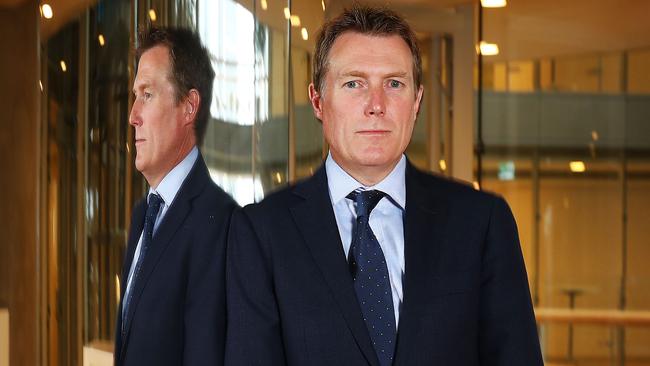Attorney-General Christian Porter’s intervention in Kazal’s case laudable
When it comes to fair dealing, Christian Porter’s intervention in a decision made by his department will take some beating.

When it comes to fair dealing, Christian Porter’s intervention in a decision made by his department will take some beating.
This move by the federal Attorney-General is an example of how governments should conduct themselves if they wish to be seen as model litigants, focused on the fairness of the legal process rather than any particular outcome.
The dispute at hand, like almost every problem associated with the NSW Independent Commission Against Corruption, has its origin in the unjust structure of the law of NSW.
This agency of the executive branch of government has been empowered to make the most devastating findings about anyone in NSW, but the parliament of that state will not permit anyone to test the merits of those findings. ICAC, it seems, is just like the Pope — infallible.
This means the officers inside this agency can make all sorts of factual errors safe in the knowledge that parliament has decided that nobody is allowed to use the courts to check if they got their facts right.
This has created a terrible moral hazard. If any organisation knows that its ineptitude will never be discovered, what incentive is there to weed out those who are too thick or bent to do their job? The results are predictable.
As the accompanying article demonstrates, this commission based the findings of one report on evidence from a brain-damaged witness suffering from amnesia. It produced another report that ignored secret evidence from two former premiers that undermined the report’s thesis.
Both those reports went to parliament — the same parliament that designed a legal structure that presumes ICAC can do no wrong.
This is the context in which Porter’s latest move needs to be viewed.
In order to ensure that one of the victims of ICAC’s injustice was not deprived of an opportunity to seek redress before the UN Human Rights Committee, Porter has overruled a decision of his own department.
Without his knowledge, the Attorney-General’s department wrote to the UN Human Rights Committee on February 14 urging it to reject a complaint about ICAC that had been lodged by businessman Charif Kazal. The department told the UN committee that Kazal had not exhausted all possible domestic remedies.
When Porter found out he intervened in a way that, while not siding with Kazal, looks like ensuring this man’s quest for justice is not thrown out on a technicality before the merits of the argument can be heard.
That technicality is not insignificant. The UN committee is unable to accept disputes about abuses of human rights if there is still a chance they can be resolved domestically.
Soon after lodging his complaint with the UN, Kazal launched civil proceedings in the NSW Supreme Court against ICAC, former ICAC commissioner David Ipp and the state of NSW.
He wants a range of remedies including a declaration of misfeasance, damages and a declaration that ICAC’s 2011 findings against him are a nullity.
Once Porter learned that his department had tried to shut down Kazal’s complaint, he asked his officials to write again to the UN committee, this time suggesting that should the committee find Kazal’s complaint to be inadmissable at this stage, it should be suspended instead of being thrown out.
The Attorney-General’s move was motivated by the pursuit of efficiency but fairness is what he achieved. If Kazal’s Supreme Court proceedings fail, the UN committee would inevitably be presented with the same complaint.
So suspending the UN proceedings pending the outcome of the Supreme Court action would eliminate the need for a second determination by the UN committee.
If anyone deserves to have his rights protected, it is Kazal.
He was found corrupt by ICAC in 2011 but was never charged with any offence, which meant he was never given what every Australian is due when they are accused of wrongdoing — a day in court to clear his name.
And the reason?
ICAC, which told the world Kazal was corrupt, also accepted there was insufficient evidence to prosecute him for corruption.
In Kazal’s case, a criminal prosecution before a real court would have been an enormous benefit. But instead, all he was left with was judicial review proceedings, which look for errors of law, not errors of fact. As with most judicial review challenges, he lost.
But this fight is not over. In this country, one of the most fundamental of all human rights is the presumption of innocence. Until a court rules otherwise, everyone is presumed innocent — including Charif Kazal.
He simply refuses to allow an over-mighty arm of government to take away a right that belongs to all Australians. This is a classical fight for human rights, yet not one of the publicly subsidised human rights legal centres and commissions has stepped forward to join the fray. Their failure should not be forgotten the next time they come looking for handouts from taxpayers.




To join the conversation, please log in. Don't have an account? Register
Join the conversation, you are commenting as Logout